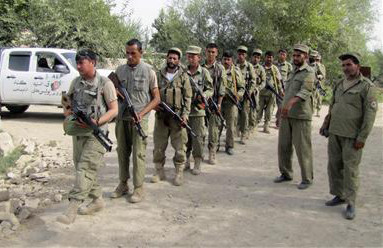By Esmatullah Mayar
There's a cloud over the Afghan Local Police (ALP). The ALP is a militia set up two years ago by US forces in villages where the Afghan National Police (ANP) - trained by NATO - is weak. Esmatullah Mayar investigates in Kunduz, Paktia and Paktika*.
A spike in armed robberies, murder and sexual aggression in the three provinces has been blamed on the local police. There are reports that top officials in the Ministry of Interior Affairs are discussing a new plan to absorb the 16,000-strong ALP in the ranks of the national police after retraining.
Killed reporters interviewed dozens of people to ascertain facts on the ground. The conclusion: there are good cops and bad cops.
Bad police
Kunduz is one of the provinces where local police units have been established in most districts. Residents say they have made their life "bitter".
Mohammad Kazem, a 35-year-old resident of Kunduz says the local police stand on the highways to rob people but when they see government authorities they claim they are government forces in charge of maintaining security of the roads. "Armed opponents of the government do not behave like they (local police) do," he declares.

Members of the Afghan Local Police prepare for a foot patrol of Char Darah district in Kunduz province, Afghanistan. (Photo: Reuters)
Kazem adds that recruits to the ALP have been involved in killings, rape, theft and other abuses. "Our request to the government is that either it should retrain them or dismiss them from the rolls of the police," he says calling for a "serious investigation" into peoples' complaints.
Another resident of Kunduz who was looted by local police but didn't want to reveal his name, said he was stopped on the highway, his mobile phone and money taken away by the local police. "They beat me, then they pushed me into a ditch. They robbed me in broad daylight," he says.
Gul Mohammad of Sra Mata area of Dasht-e-Archi districtis doubtful the masked highway robbers are local police because otherwise people would recognise them. " They robbed 20 cars in one day," he says. "They searched the women as well and took their jewelries. They don't feel shame and don't fear anybody."
Sidiq Sidiqi, the spokesman of the Ministry of Interior Affairs, is also concerned about the rising crime but says those behind them are not local police rather they are militias. "They are militias, they are people who are very obstinate and irresponsible; they don't care about the law. They have been disarmed, the operations are going on, but in some reports the illegal militias are infiltrating the local police but the fact is that they (militia) are different."
In Kunduz, one thousand men have been absorbed in local police ranks in the centre of the province, and in the districts of Dasht-e-Archi, Char Dara and Imam Sahib.
General Baba Jan,police commander of 303 Pamir Zone, says security in Kunduz has improved with the enlistment of more police. Sayed Sarwar Husaini, the security commander of Kunduz, also has the same view and says the situation was "not good" before the local police force was formed.
Though government authorities dismiss the complaints of abuse by local police, reports of the AIHRC(Afghan Independent Human Rights Commission) show the local police have been involved in very tragic incidents.
Husain Ali Moin, monitoring and investigation coordinator, AIHRC, observes: "The local police are involved in very bad incidents."
An 85-page report published by AIHRC on May 19, 2012,has interviewed 70 people - including security authorities, members of provincial councils, local tribal leaders and members of the public, and commanders of international forces.
Good police
There is a fair amount of praise for the ALP in Paktika. Security has improved in the past one year since the local police was established, Mohammad Katawazai, a resident. "By the grace of God since ISAF forces have left the area and the local police have been formed the security has improved three times," he asserts.
Lawang, leader of the Malizo tribe also seems to be happy with the local police. It was doubtful if the ALP would be able to ensure security in the province. "Others were not working for us but the local police really brought stability to the area," he said.
Nek Mohammadof Yahya Khail district says the local police were able to secure the insecure district. "The local police became successful only because they are local people and they have sympathy for their people," he said. Provincial police commanderDawlat Khan Zadran echoes the same view.
The view in Kabul
Minister of Interior Mujtaba Patang told the National Assembly on Dec 4 the ALP has failed in some areas. He accused the force of being partisan. "Contrary to our expectation the local police did not give good results in the country," he said. The ministry is considering absorbing the ALP in the ranks of the ANP after retraining, he added.
Abdul Satar Saadat, legal expert, supports the plan to nationalise the local police. "The ALP, the brainchild of the former US commander (David H. Petraeus), was put into practice in Iraq, and then imposed on Afghanistan," he says. In September this year, the US suspended the training of new ALP recruits following a surge in killings by Afghan forces of their western trainers.
*Additional reporting by Mohammad Yasin Yasin, Ismail Larawai, Humayun Wahdat



